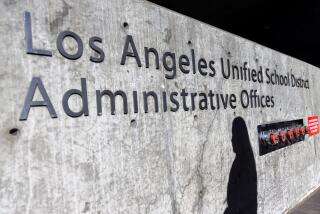National Hotline Could Help Save Kids
- Share via
Perhaps no type of crime has received more attention in recent years than crimes against children involving sexual acts and violence. Several tragic cases have focused public attention on these heinous crimes and resulted in public demand that government take stronger action against those who commit them.
This is an issue that crosses political boundaries. There is agreement among government officials across the political spectrum that the government must crack down on those who threaten our children.
As is the case with much public policy, California has consistently led the nation in developing legislation to protect children from sexual predators. Our state has required the registration of its convicted sexual predators since the 1940s, decades before it was mandatory or even politically popular to do so anywhere else in the nation.
California again took a progressive step when it developed a child molester hotline. Members of the public can call it to determine whether an individual is registered as a convicted sexual predator. Kids Safe, a citizens group that has become one of the nation’s leading organizations on child abuse issues, promoted this concept through notification and education. Kids Safe’s public-service campaign included billboard and radio ads, as well as unceasing pressure to implement the hotline on a national level.
We have tested this approach in California for almost two years and it has been extremely successful. California’s attorney general, law enforcement and local officials have hailed this hotline as a success.
“Over the past year, the line has received a greater percentage of hits than I ever expected,” said state Atty. Gen. Dan Lungren after the first year of operation. “With almost 500 hits--calls in which the subject is positively identified as a registered child molester--we know that many children have been saved from a horrible crime.”
The positive hits have continued. Since its inception, California’s hotline has helped thousands of parents and other adults identify nearly 1,000 convicted child molesters out of 11,000 inquiries.
It is time to bring this valuable tool to the rest of the nation. Children in every state deserve the same protections that children in California now have. Additionally, it is important for citizens to know if a suspicious individual is registered as a sexual predator in another state.
Although a sexual predator is required to register upon moving into the state of California, there is no provision to guarantee this will happen in a timely fashion, if at all. By allowing access to registration records in other states, parents will be better able to protect their children from sexual predators who have avoided registering in their state or fallen through the cracks.
Inspired by Kids Safe, I have introduced HR 2194, the Child Protection Act. This bill would establish a national hotline modeled after ours in California. The Child Protection Act has received wide bipartisan support from 40 of my colleagues in Congress who have agreed to co-sponsor it. Like the California program, this national hotline would provide access to the names of convicted sexual predators only.
This proposal strikes a balance between the privacy rights of individuals and parents’ need for information. It provides appropriate limits on who may obtain information and the purposes for which information may be used. This bill is part of a continuing fight against the relentless predators who target the most defenseless of our citizens--our children.
(BEGIN TEXT OF INFOBOX / INFOGRAPHIC)
California Registry For a $10 fee, the public can dial (900) 463-0400 and learn whether up to two individuals are among California’s registered child molesters. Callers must be 18, give their name and explain how a child is at risk of molestation. They also must have the individual’s name and either his or her address, driver’s license number, Social Security number or date of birth.
More to Read
Get the L.A. Times Politics newsletter
Deeply reported insights into legislation, politics and policy from Sacramento, Washington and beyond. In your inbox twice per week.
You may occasionally receive promotional content from the Los Angeles Times.










